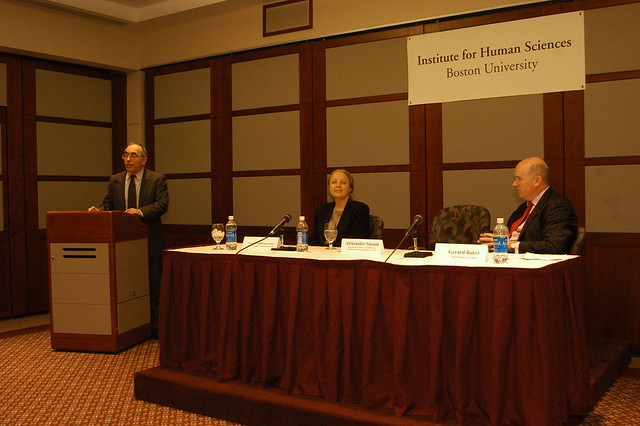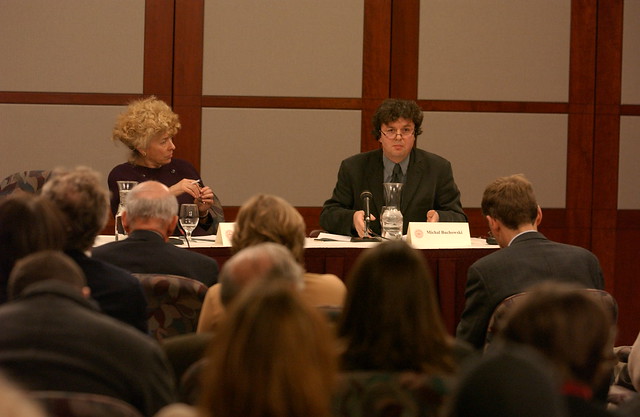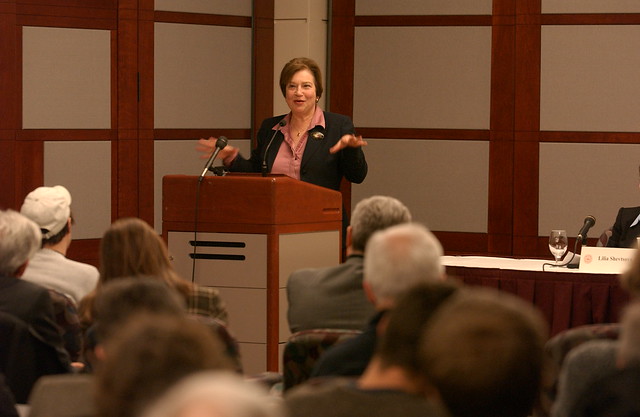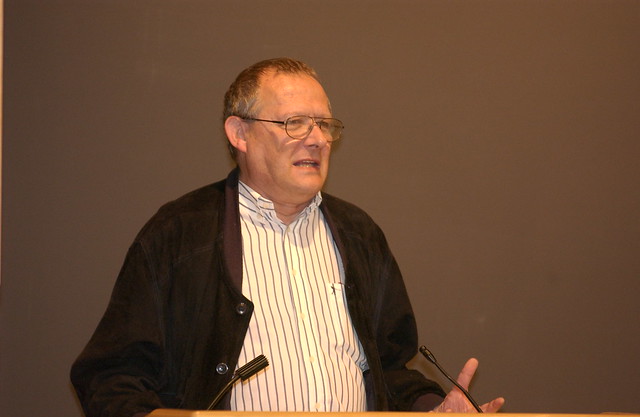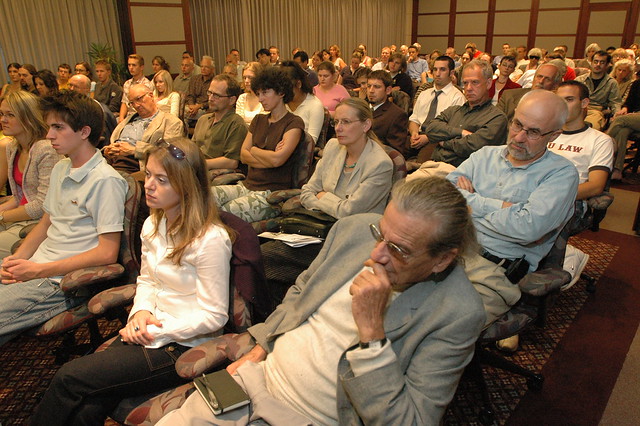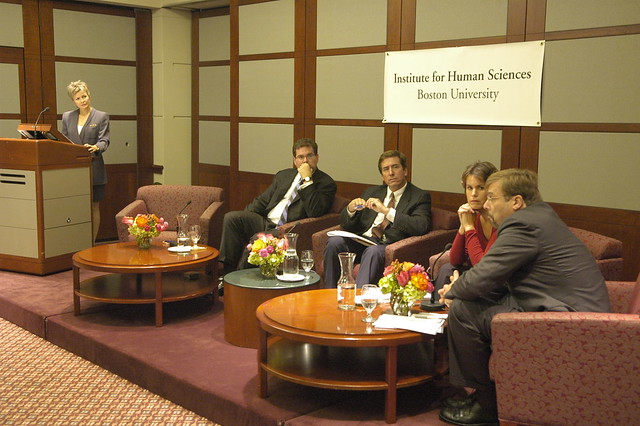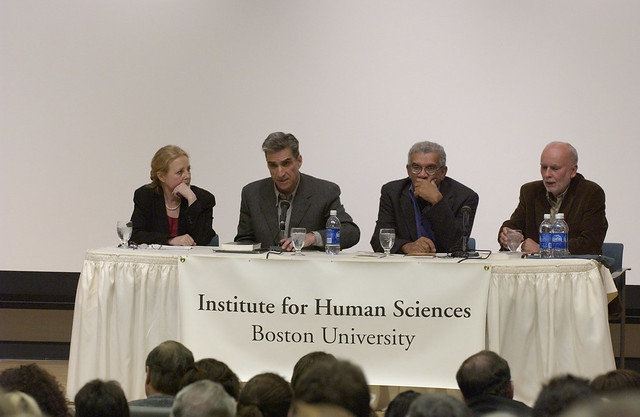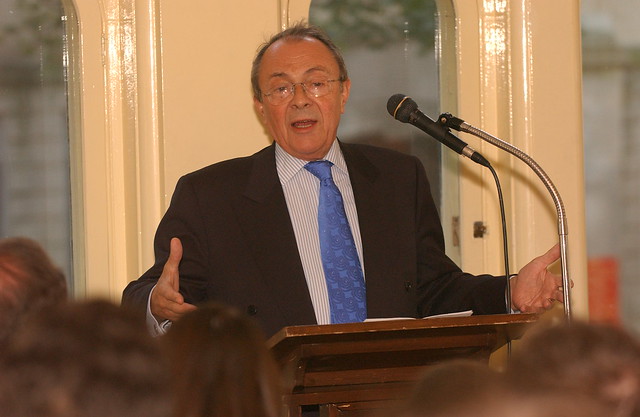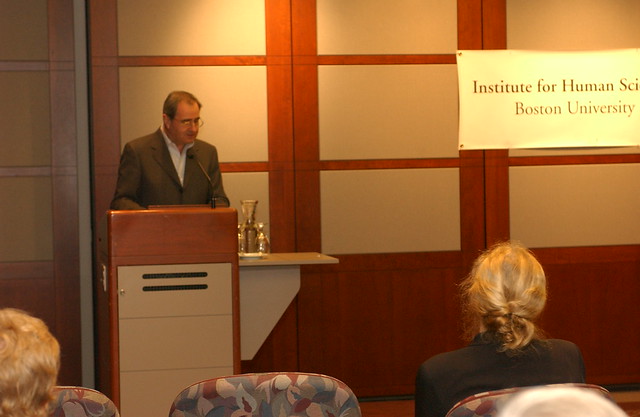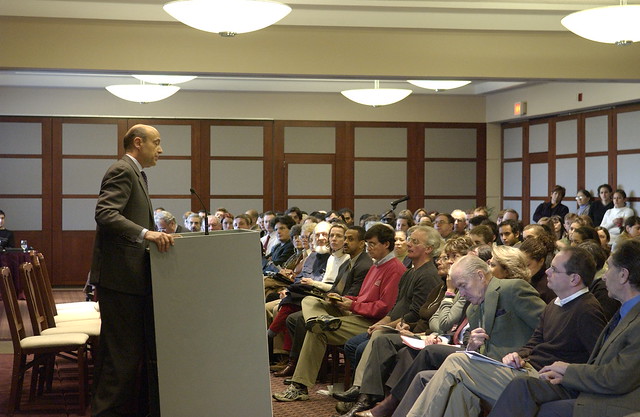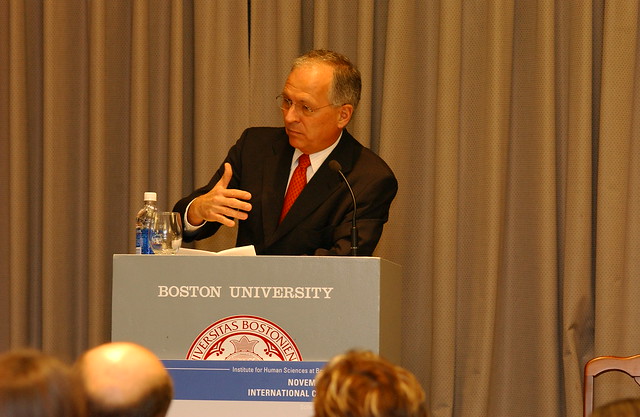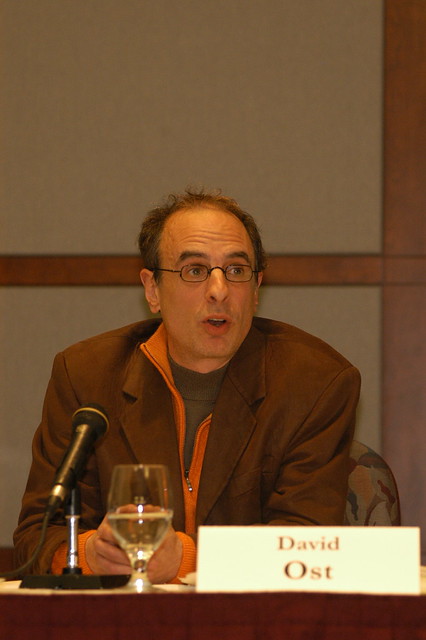2004
January | February | March | April| May | June | July | August | September | October | November | December
February
February 12 | Panel Discussion: New Europe Faces America
Aleksander Smolar
Senior Research Fellow at the CNRS, Paris;
President, Stefan Batory Foundation, Warsaw
Gerard Baker
Chief US Commentator, Financial Times
March
March 1 | Panel Discussion: The Challenges of European Integration: Views from “Old” and “New” Europe
Gesine Schwan
President, Europa-Universität Viadrina
Michal Buchowski
Professor of Anthropology at the University of Poznan in Poland and of Comparative Central European Studies at Europe-University Viadrina in Frankfurt/Oder
Organized by the Institute for Human Sciences at Boston University and the American Council on Germany in cooperation with the Consul General of the Federal Republic of Germany
Listen to this lecture on the EU for You podcast.
March 18 | Panel Discussion: Putin’s Second Term: Prospects for Russia and America
Lilia Shevtsova
Senior Associate, Carnegie Endowment for International Peace, Moscow
Angela Stent
National Intelligence Officer for Russia and Eurasia at the National Intelligence Council; on leave from Georgetown University and of Comparative Central European Studies at Europe-University Viadrina in Frankfurt/Oder
Moderator: Arnold Horelick
RAND Corporation; former Vice President Russian and Eurasian Affairs at the Carnegie Endowment for International Peace
Listen to this lecture on the EU for You podcast.
April
April 28 | Panel Discussion: The End of the Affair? “New” Europe and the United States
Adam Michnik
Editor-in-Chief, Gazeta Wyborcza
Jonathan Schell
Harold Willens Peace Fellow, The Nation Institute
In cooperation with the Polish American Networking Organization (PANO)
Listen to this lecture on the EU for You podcast.
September
September 13 | The New Atlantic Partnership
Andrzej Olechowski
European Deputy Chairman of the Trilateral Commission
and former Polish Minister of Foreign Affairs
Respondent: John Darnton
Associate Editor, The New York Times
In cooperation with the Polish American Networking Organization (PANO)
September 29 | Conference: The Concave Mirror: The US and Europe Look at Eachother
Ron Asmus
The German Marshall Fund of the United States
Laurence Bagot
Staff Reporter, Enjeux les Echos; 2005 Nieman Fellow, Harvard University
Klaus-Dieter Frankenberger
Foreign Policy Editor, Frankfurter Allgemeine Zeitung
Jim Smith
Foreign Editor, The Boston Globe
Moderator: Gail Harris
Journalist, PBS and NPR
A presentation of the results of the Transatlantic Trends 2004 survey undertaken by the German Marshall Fund in Europe and the United States on European and American attitudes toward one another. Following in the footsteps of Transatlantic Trends 2003 and Worldviews 2002, the 2004 survey examined pressing transatlantic topics such as terrorism, WMD and threat perception; US and European willingness to use force; the role of the UN and other international institutions; the War in Iraq; Turkey and the EU; and the overall state of US-European relations.
In cooperation with the German Marshall Fund of the United States and the American Council on Germany
Listen to this conference on the EU for You podcast.
October
October 1 | European Agricultural Policy: A Conversation with Franz Fischler
Franz Fischler
European Union Agricultural Commissioner
The Agricultural Commissioner of the European Union answers questions on agricultural subsidies and their impact on developing nations, EU-US relations, and Turkey in Europe.
Event organized by European Studies at Boston University in cooperation with the Institute for Human Sciences
October 5 | Poetry and Politics
Robert Pinsky
United States Poet Laureate 1997-2000;
Professor of English and Creative Writing, Boston University
Derek Walcott
1992 Nobel Prize Laureate in Literature;
Professor of English and Creative Writing, Boston University
Adam Zagajewski
Polish poet, novelist, essayist
Moderator: Irena Grudzinska Gross
In cooperation with the Creative Writing Program at Boston University and the Department of Foreign Languages and Literatures at the Massachusetts Institute of Technology
Listen to this lecture on the EU for You podcast.
October 6 | Some Reflections on That Uselessly Unpleasant Franco-American Relationship
Michel Rocard
Member, European Parliament and former Prime Minister of France
Respondent: Mark Lilla
Professor of Social Thought, University of Chicago
In cooperation with the Consulate General of France in Boston and the French Library and Cultural Center / Alliance Française of Boston and Cambridge
Listen to this lecture on the EU for You podcast.
October 21 | European Institutions and the Future of Democracy
Pierre Rosanvallon
Director of Studies, Centre de Recherches Politiques Raymond Aron, EHESS, Paris; Professor of Modern and Contemporary Politics, Collège de France
Respondent: Vivien Schmidt
Jean Monnet Professor of European Integration,
Department of International Relations, Boston University
November
November 16 | International Conference: The United States and Europe: Partnership or Competition
The focus of the conference was American vs. European perspectives on the Middle East. Panelists discussed problems and solutions, especially instruments of international cooperation.
Opening Remarks: John Silber
President Emeritus, Boston University
Session I – European vs. American Perspectives on the Middle East
Keynote Speaker: Alain Juppé
Mayor of Bordeaux and former Prime Minister of France
Panel Discussion
James Hoge
Editor-in-Chief, Foreign Affairs (Chair)
Rachel Bronson
Director of Middle East and Gulf Studies, Council on Foreign Relations
Thérèse Delpech
Atomic Energy Commission in Paris
Michael Mertes
Partner at “dimap consult”, a think tank based in Bonn and Berlin, and former policy advisor to Helmut Kohl
David Phillips
Senior Fellow and Deputy Director, Center for Preventive Action, Council on Foreign Relations
Session II – Instruments of International Cooperation
Keynote Speaker: Wolfgang Ischinger
Ambassador of the Federal Republic of Germany to the
United States of America
Panel Discussion
Aleksander Smolar
CNRS, Paris; President of the Stefan Batory Foundation, Warsaw (Chair)
Maarten Brands
Professor of History, University of Amsterdam
Charles Kupchan
Professor of International Relations, Georgetown University; Director of Europe Studies, Council on Foreign Relations
Stephen Walt
Belfer Professor of International Relations, Kennedy School of Government, Harvard University
In cooperation with the Duitsland Instituut Amsterdam
Listen to the keynote speeches on the EU for You podcast.
December
December 1 | The Domestic Implications of Turkey’s EU Drive
Suhat Kiniklioglu
Transatlantic Fellow, German Marshall Fund of the United States
In cooperation with the German Marshall Fund of the United States and the Department of International Relations at Boston University
December 5 | Panel Discussion: Jacek Kuron’s Legacy: the Last Dissident
Padraic Kenney
Professor of History at the University of Colorado, Boulder
David Ost
Professor of Political Science at Hobart and William Smith Colleges
Joanna Regulska
Professor of Women’s and Gender Studies, Professor of Geography, and Chair of the Department of Women’s and Gender Studies at Rutgers University, New Jersey
Jacques Rupnik
Professor of Political Science and Research Director at CERI – Fondation Nationale des Sciences Politiques, Paris; Professor of History at the Sorbonne and Professor of Politics at the Institut d’Etudes Politiques, Paris
Andrzej Tymowski
Director of International Programs at American Council of Learned Societies
Moderator: Irena Grudzinska Gross
Jacek Kuron (March 3,1934 – Jun 17, 2004)
Jacek Kuron was one of the most important oppositional leaders in Eastern Europe. Born in the then Polish (and now Ukrainian) Lviv, into a Socialist family, he lived through World War II and the German occupation first in Lviv then in Warsaw. Early in the 1950s, he joined the Communist Party and founded the “red” scouting organization, teaching cooperative methods and social goals. In 1956, during the rebellious “Polish October,” he participated in workers’ protests and was expelled from the Party, which he rejoined, only to be expelled again. In the late 1960s and 1970s, between several prison stays, he was one of the most fearless and imaginative leaders of the democratic opposition. His most famous quote came as the protesting workers were setting fire in 1970 to the building that housed Party Committee headquarters: “Don’t burn Committees. Create your own!” He was a founding member of KOR – the Committee to Defend Workers – and of the Baltic Coast workers committees, the institution that led to the creation of the Solidarity movement. While Solidarity existed, he was an adviser to Lech Walesa. When the introduction of martial law ended the short period of liberty in Poland, Jacek Kuron was again sent to prison. In 1989, he played a pivotal role in the Roundtable Accords and in the formation of the first democratic government, in which he served as Minister of Labor and Social Policy, taking upon himself, as usual, the most difficult and thankless task of reconciling market reforms with social protections. Gradually incapacitated by illness, he never stopped agitating for social justice and citizens’self-organization.
In cooperation with the American Council on Learned Societies and the journal East European Politics and Societies

